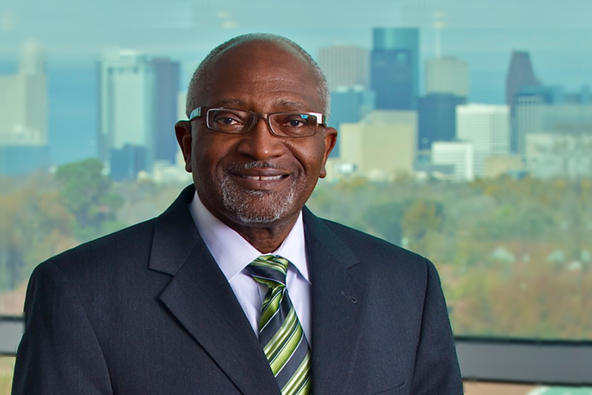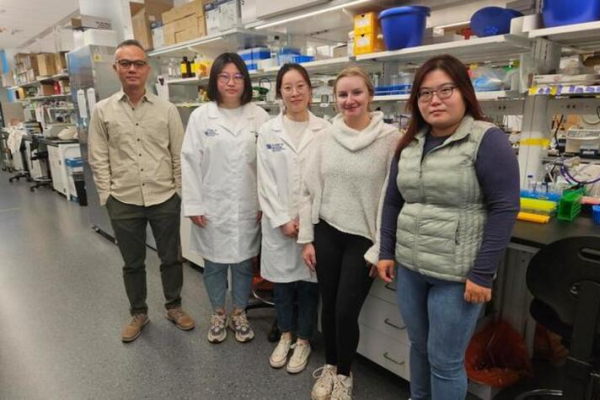'Father of Environmental Justice' and Local High School Students Headline CCTS Conference

The University of Kentucky Center for Clinical and Translational Science (CCTS) will host its 17th Annual Spring Conference on April 5, focusing on climate and health and featuring a keynote address and book signing with Robert Bullard, Ph.D., considered the father of environmental justice.
The conference, which is free and open to the public, will be held in person at the UK Gatton Student Center; masks are encouraged. Bullard’s keynote will also be available via a livestream to conference registrants only but will not be recorded. Registration and the full agenda are available here; please register by March 28.
Bullard’s impactful career began in 1979 with his work on the landmark Bean v. Southwestern Waste Management, Inc. case, which fought the placement of a landfill in a middle-class Texas neighborhood that was 82% Black. A sociologist by training, Bullard was called as an expert witness in the trial and conducted what became the first comprehensive account of ecoracism in the United States. In a study titled, “Solid Waste Sites and the Black Houston Community,” he found that although Black residents comprised only 25% of the local population, 14 of the 17 garbage dumps, garbage incinerators and landfills were placed in Black neighborhoods — decisions made by white city leaders with no input from Black residents. The Bean case was the first in the nation’s history to use civil rights laws in an argument of environmental discrimination in waste facility siting.
In the years following, Bullard’s study of environmental justice expanded across the southern United States. He published his first book, “Dumping in Dixie: Race, Class, and Environmental Quality,” in 1990, and has since published another 17 books that address sustainable development, environmental racism, urban land use, industrial facility siting, community reinvestment, housing, transportation, climate justice, disasters and emergency response, community resilience, smart growth and regional equity.
The awards for his activism are too numerous to list in full, but highlights include the United Nations Environment Program Champions of the Earth Lifetime Achievement Award (2020); the Children’s Environmental Health Network’s Child Health Advocate Award (2017); the American Bar Association’s Excellence in Environmental, Energy and Resource Stewardship Award (2015); the Sierra Club’s John Muir Award (2013); and being named by Newsweek as one of 13 Environmental Leaders of the Century (2008).
Bullard currently serves as Distinguished Professor of Urban Planning and Environmental Policy and director of the Bullard Center for Environmental and Climate Justice at Texas Southern University. He is co-founder of the Historically Black College & University (HBCU) Climate Change Consortium and a U.S. Marine Corps veteran.
“We’re honored to host Dr. Bullard, whose pioneering work to ensure that everyone has the right to live, work and play in a healthy environment — especially here in the South — has helped us understand how longstanding injustices continue to perpetuate worse health outcomes for people of color and people without socioeconomic resources,” said conference co-chair Erin N. Haynes, Dr.PH., the Kurt W. Deuschle Professor of Preventive Medicine and Environmental Health and associate director of the CCTS.
William C. Haneberg, Ph.D., state geologist, director of the Kentucky Geological Survey, and a research professor in UK’s Earth & Environmental Sciences Department, also serves as conference co-chair.
After the keynote, a Climate and Health Panel Discussion will feature Haneberg, Lala Ma, Ph.D., assistant professor of economics in the UK Gatton College of Business and Economics, and Tom “Fitz” Fitzgerald, J.D., adjunct professor of energy and environmental law at the Brandeis School of Law, University of Louisville. Brief presentations from the perspective of geologists, environmental economists and advocates will be followed by a Q&A.
Students from Fredrick Douglass High School Will Present Research
Another highlight of this year’s CCTS conference will be the attendance of students from Lexington’s Fredrick Douglass High School Biomedical Sciences Pathway program. This group consists of 55 high school juniors, 60% of whom are from backgrounds historically underrepresented in biomedicine and research. Twenty of the students will present research posters focused on cancer at noon during the conference in the Gatton Student Center Grand Ballroom.
The students will also tour UK’s Markey Cancer Center, whose researchers will give feedback on their poster presentations, and get a crash course in translational science with CCTS’s research development director Joel Thompson, Ph.D.
Amanda Ellis, Ph.D., assistant professor of biostatistics in the UK College of Public Health, serves as faculty liaison for the outreach program with Fredrick Douglass High School. The Douglass teacher who leads its Biomedical Pathways Program, Jennifer O’Brien, is completing a master’s degree in UK’s College of Public Health (CPH) and did an internship with Ellis over the summer, which is how the CPH/Fredrick Douglass High School partnership was born.
As a first-generation college graduate and director of CPH’s new master’s program in biostatistics, Ellis is deeply committed to fostering diversity, inclusion and accessibility for students of all backgrounds to reach graduate and professional levels. She hopes that by partnering with the high school’s Biomedical Pathways program, its students will be able to consider and prepare for the wide array of opportunities in health sciences.
“These are students who want to go out and help people and we hope this partnership shows them there are avenues they might not even know about, beyond being a doctor or a nurse, especially in the public health space,” she said. “And we have a pipeline issue when it comes to trying to recruit a diverse group of students at upper levels because we haven’t done enough to create diversity and equity at the undergrad levels. So, we have to intentionally develop these pathways to get students to the graduate level, and that means reaching them earlier than college.”
The CCTS conference will also feature:
-
More than 200 poster presentations across disciplines
-
The Von Allmen Center 60-Second Poster Pitch Competition
-
Mentor Recognition Awards
-
College of Dentistry Research Day
-
College of Nursing Scholarship Showcase
-
College of Public Health Research Day
-
College of Health Sciences Research Day
Co-sponsors in presenting this year's distinguished keynote speaker include the UK Appalachian Center & Appalachian Studies Program, Center for the Environment, Center for Health Equity Transformation, College of Nursing, College of Public Health, Department of Earth and Environmental Sciences, Kentucky Geological Survey Kentucky Water Resources Research Institute, Tracy Farmer Institute for Sustainability & Environment, University of Kentucky Center for Appalachian Research in Environmental Sciences (UK-CARES), UK Superfund Research Center and the UNITE RPA — United in True Racial Equity Research Priority Area.
The CCTS is pleased to present this conference each year as part of its mission to accelerate discoveries that improve health and train upcoming generations of translational researchers.
The project described was supported by the NIH National Center for Advancing Translational Sciences through grant number UL1TR001998. The content is solely the responsibility of the authors and does not necessarily represent the official views of the NIH.
Credits
Mallory Profeta (Center for Clinical and Translational Science)

